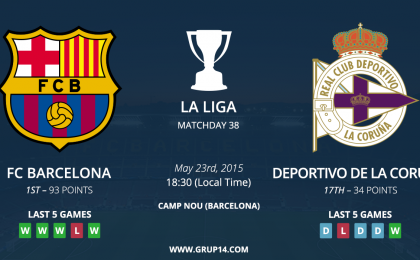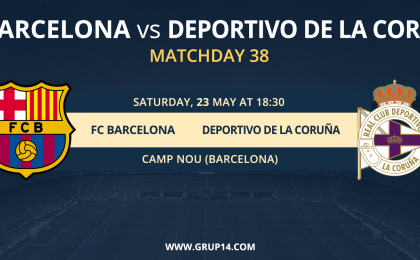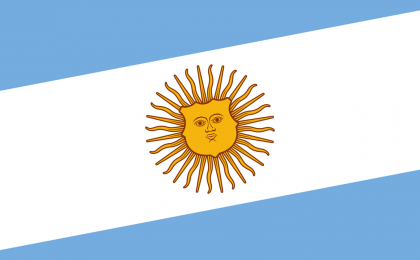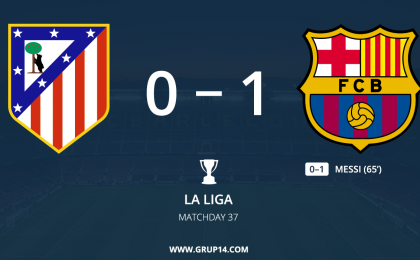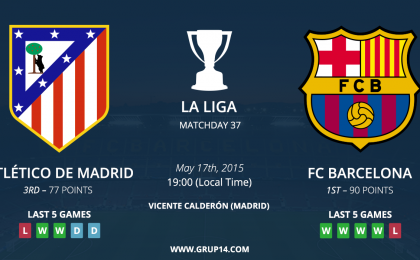 history | 2015-05-23
history | 2015-05-23
The Argentinians of FC Barcelona - Part Two
Riquelme's genius to Messi's magic
Barcelona signed two Argentines in the 2001/02 season and they did the same thing in the 2002/03 season adding two more players. With Roberto Bonano and Javier Saviola already with the team, the club signed left back Juan Pablo Sorin in January of 2003, on loan for the rest of the season from Brazilian club Cruzeiro, and this writer’s personal favorite, Juan Román Riquelme. Sorin made his league debut on February 9 in a 2-2 draw against Athletic Bilbao. Known for his energy and stamina, he played a total of 15 league matches for Barcelona, even scoring a goal in a 2-0 win against Celta de Vigo on June 21, 2003. Javier Saviola scored the second goal of that match. Following the end of his short-term loan, Sorin then joined French club Paris Saint-Germain.
On to the other Argentine, Juan Román Riquelme. Personally speaking, Riquelme is one of my favorite players and one of the most talented to have ever put on a pair of boots. A playmaker in every sense of the word, Riquelme dictated the tempo of the game. His vision was up there with the best, he has great free kicks and his long-range shots are more than formidable. His ability to split open an entire team with a single pass is one that only a select few of world football are capable of doing. Now as you’re reading what I just wrote, you might be thinking to yourself “If he’s that good, how come he only played one season with Barcelona?” The problem with Riquelme wasn’t his talent; that is not up for debate. The problem was you’d never know when he’d decide to actually show up and play. Riquelme is the type of player who you would hear the announcer say his name either every 30 seconds or every 30 minutes. There was no in-between. Another peculiarity of his, and this was very easy to see during his time with Barcelona, was that it was essentially his way or the highway.
One of the many nicknames Riquelme has earned throughout his career was that of the Lazy Magician. Riquelme walked around at his own languid pace. Think of smoke burning off a cigarette, that was Riquelme walking around the pitch. And then he’d conjure up enough energy and like a gazelle, he’d start running. That description should give you some idea as to why he didn’t always see eye to eye with coach Louis Van Gaal. True to his idea of the collective team effort over individual brilliance, Van Gaal reportedly once said to Riquelme, “You’re the best player when you have the ball, but when you don’t, we play with one less.”
Riquelme, whose preferred position was in the middle of the pitch, moving around behind the front line, began being played out of position. Taking over the number 10 shirt and being the first Argentine since Diego Maradona at Barcelona to do so, Riquelme was eventually deployed as a winger under Louis Van Gaal. What essentially cut his time at the Camp Nou short was his stubbornness and refusal to share the same views as the coach. His form dipped, his appearances with the team became more of a substitute’s role than as a starter, and a loan move which eventually became a permanent one to Villarreal was in the cards for him. Riquelme left a total of six goals in 42 matches in Barcelona.
However, he still has friends at the club, Andres Iniesta being one of them. Iniesta once said about Riquelme, “Sharing a team and training with Román was a pleasure. Just by seeing him every day, I learned a lot.” The praise goes both ways as Riquelme was quoted as saying: “For me the best is Iniesta. There is no other like him. He is unique. If the game is locked, Guardiola sends him on. Left, right, in attack, he can do well anywhere. When I was there, he was 15 or 16 years old and trained with us. He made a big difference even at that age.” Genius appreciating genius.
For the 2004/05 season, the club again picked from the River Plate team and signed one of River Plate’s alumni from their youth system -- a striker, Maximiliano “Maxi” Lopez. Not having the best of success with former River players, this signing wasn’t going to be any different for the Catalans. The tallest Argentine the club has ever signed, coming in at just under 190 centimeters, Maxi Lopez’s 15 minutes of fame at Barcelona came in his Champions League debut when he scored after coming on to give Barcelona a 2-1 win against Chelsea. Wearing the number 11 shirt, Maxi Lopez won two league titles, a Copa del Rey and was even part of the 2006 Champions League winning team. However, that success was more down to Barcelona’s overall attack of Ronaldinho, Samuel Eto’o, Lionel Messi, Ludovic Giuly and Henrik Larsson rather than a certain contribution by Maxi himself. After spending two seasons with the club, his place with the team was obviously lost and he was sent on loan to Mallorca where he ended up signing with them. Scoring a total of two goals, one in the Copa del Rey and one in the Champions League, he amassed a total of 19 caps for the team.
At the time of Maxi’s arrival, a certain diminutive Argentine was making the jump from the youth team to the senior team. That Argentine was given the number 30 shirt and his time with Barcelona hasn’t been too bad. He slowly integrated into the team, where he eventually formed a pretty good attacking trio with Ronaldinho and Samuel Eto’o. He made a name for himself following a fantastic performance against Chelsea in Stamford Bridge where his trickery on the ball got Assier del Horno sent off. He was and still is being compared to Diego Maradona and those comparisons reached new heights in a Copa del Rey match against Getafe where he scored a goal very similar to that of Diego’s against England at the 1986 World Cup. He has scored a goal for Barcelona with literally every part of his body: His legs, his head, his chest and even with his hand. He has enjoyed some success with the club, scoring cup-winning goals, shattering decade-old records and in the process becoming Barcelona’s all-time leading goalscorer. If you haven’t guessed who I’m talking about by now, you probably haven’t been watching the sport for the past decade.
Lionel Messi, really, what more can you say? Debuting in 2004, scoring his first goal for the club against Albacete in 2005, winning Ballon d’Or after Ballon d’Or, everything that could be said, has already been said about the best player in the world. He can retire today and he’ll be regarded as one of the best players the game has ever seen. And for some, the very best.
The 2007/08 season officially saw two Barcelona players’ contracts terminated. Javier Saviola and Maxi Lopez’s time with the club were done and dusted. Lionel Messi was an established player in the team and defender Gabriel Milito was signed from Real Zaragoza. A troubled season in Barcelona, Frank Rijkaard’s romantic relationship with the club was on its final stretch but Gabriel Milito was brought in to help the backline. A regular starter on the team, Milito suffered a serious injury in his right knee which sidelined him for nearly two years. He suffered his knee injury in May 2008 and played his first competitive match back in January 2010. Shortly after recovering from his injury, Milito found himself playing 17 matches in the second half of the season. His final year with the club came in 2010/11 where he played more of a substitute role. He later went on to return and play at his boyhood club Independiente in Argentina. He has since retired.
The latest Argentine player to sign with Barcelona is Javier Mascherano who joined the team in the summer of 2010 from Liverpool. The first half of the season saw Mascherano playing as a substitute for Sergio Busquets in defensive midfield. However, the second half of the season saw him play in the central defender role, even starting the Champions League final in that position. A natural defensive midfielder, he has been played as a CB for Barcelona under the four different coaches who have managed him at the club. A leader and very vocal by nature, he is willing to sacrifice his body and gives it his all for the team, some even comparing his leadership qualities with that of legendary club captain Carles Puyol. While he has yet to score a goal for Barcelona, he has stopped several goalscoring opportunities for the opposition. He remains a vital part of the team.
Moving on from the players to the coaches, Barcelona has only had two Argentine managers in the club’s history. Having won the 1978 World Cup with Argentina, Barcelona signed the first ever Argentine coach at the club, the legendary Cesar Luis Menotti in 1983. An attack-minded coach, Menotti lasted only one season on the sidelines but he did manage to win the Copa del Rey, Copa de La Liga and the Spanish Super Cup.
It would take 30 years before the Catalan club would sign their second Argentine coach, Gerardo Martino. Tito Vilanova had to step down the season before due to health issues and the Barcelona board looked for a foreign manager from Argentina to take over the helm at the club. Only managing to win the Spanish Super Cup, Martino’s time at Barcelona was less-than-glamorous. The team was eliminated in the quarterfinals stage of the Champions League against Atlético Madrid and lost the Copa del Rey final to rivals Real Madrid. That left them with the league to play for. Needing a win on the final matchday of the season at home, Martino’s men only managed to get a draw against Atlético Madrid, allowing their opponents to celebrate winning the league at the Camp Nou. Gerardo Martino left the club shortly after.
When you think of Argentine players at Barcelona, naturally, you’ll think of Lionel Messi. However, as this article has shown, many legends from Argentina have worn the famous Blaugrana shirt. Obviously not all were able to enjoy the success of the recent signees, but most left some sort of mark at the club.
Players
Emilio Sagi Liñán (1916 to 1932)
Pedro Pascual Ros (1939 to 1940)
Florencio Caffaratti (1947 to 1949)
Marcos Aurelio Di Paulo (1948 to 1951)
Mateo Nicolau (1948 to 1952)
Humberto Gimenez (1949 to 1950)
Carlos Medrano (1959 to 1960)
Juan Carlos Heredia (1972 to 1979)
Bernardo Cos (1972 to 1976)
Rafael Zuviría (1977 to 1982)
Diego Maradona (1982 to 1984)
Jorge Gabrich (1983 to 1987)
Juan Antonio Pizzi (1996 to 1998)
Mauricio Pellegrino (1998)
Roberto Bonano (2001 to 2003)
Javier Saviola (2001 to 2007)
Juan Pablo Sorin (2003)
Juan Román Riquelme (2002 to 2005)
Maximiliano Lopez (2005 to 2007)
Lionel Messi (2004 to present)
Gabriel Milito (2007 to 2011)
Javier Mascherano (2010 to present)
Coaches
Cesar Luis Menotti (1983 to 1984)
Gerardo Martino (2014 to 2015)




